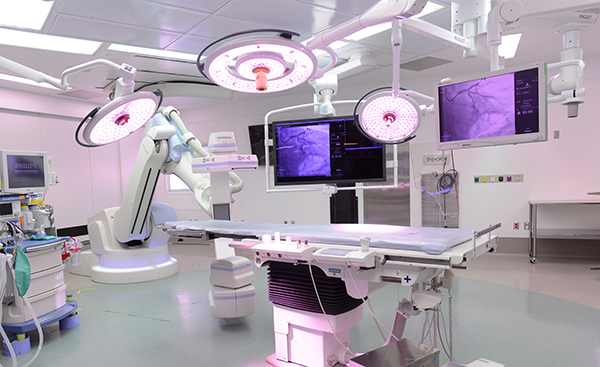About Gynecological Cancers
Gynecologic cancers are diseases of women’s reproductive organs. Our multidisciplinary team has diagnosed and treated them all. Your care team of gynecologic oncologists and radiation oncologists work together to create a plan for your unique treatment needs.
Reproductive cancers affect more than your body. They impact your overall health, emotions, family, and future fertility. Our team understands and takes your concerns to heart. You will be treated as the one-of-a-kind person you are, with your own care needs and treatment goals.
Types of Gynecological Cancers
- Cervical cancer. This is cancer that starts in the cervix. The main cause is a long-lasting infection with certain types of human papillomavirus (HPV). HPV is a common virus that passes from one person to another during sex. It is the third most common gynecologic cancer. The high effectiveness of screening Pap smears allows the disease to be prevented, detected, and treated in early stages.
- Ovarian cancer. Ovarian cancer develops in the ovaries and may also occur in these related areas: the fallopian tubes and the peritoneum (the tissue lining covering organs in the abdomen). It is more common in post menopausal women, and treatment works best when the cancer is found early. Currently, there are no effective screening tests for ovarian cancer, but there may be genetic associations. The symptoms can be vague and unfortunately, it is usually diagnosed in later stages. Knowing one's family history is important.
- Uterine cancer. This cancer starts in the uterus, which is the organ where a baby grows during pregnancy. There are different types of uterine cancer depending on whether the cancer starts in the lining or in the muscles of the uterus. Abnormal bleeding or bleeding after menopause is a key presenting sign.
- Vaginal cancer. It is a rare type of cancer that starts in the vagina (also called the birth canal). It is more common in women 60 and older, and you’re more likely to get it if you have had a human papillomavirus (HPV) infection. Patients with abnormal cells in the vagina, cervix, or uterus are at higher risk.
- Vulvar cancer. This rare disease develops when malignant cancer cells form in the tissues of the outer part of the female genitals, called the vulva. The cancer usually grows slowly over a period of years. Any suspicion of abnormal skin or changes in the vulva should be checked by a medical professional.

“Dear Cancer: You Can Never Weaken the Human Spirit.”
Infusion nurse Irene Paige brings strength, comfort, and expert care to patients receiving chemotherapy and immunotherapy at McGlinn Cancer Institute.
Evaluating Gynecologic Cancers
If you have certain symptoms that are concerning, a pelvic exam will most likely be the first step in establishing a diagnosis. A general physical is performed and includes evaluation of the lymph nodes. A pap smear is obtained if indicated. If the results of these exams are abnormal, you might be advised to have more diagnostic tests, including:
- Biopsy. With this test, the doctor takes a small sample of tissue from the affected area and sends it for analysis in the laboratory to obtain a diagnosis. In some cases, biopsies are obtained with magnification using a special machine called a colposcope. The procedure is called a colposcopy, and it is usually done for further evaluation of an abnormal pap smear.
- Endoscopic procedures. These tests use a lighted tube (endoscope) with a video camera on the end. It lets the doctor use a monitor to see any abnormal areas in the reproductive organs and obtain biopsies.
- Imaging tests. Pictures are taken of the inside of your body to look for cancer, learn how far it has spread, and help see if treatment is working. Types of imaging tests include computed tomography (CT) scans, nuclear medicine scans (such as bone scans and thyroid scans), magnetic resonance imaging (MRI) scans, and positron emission tomography (PET).
- Pap test. Cells are taken from the cervix and viewed under a microscope. The test looks for cancerous or abnormal cells that may, without treatment, progress to cancer.
- Transvaginal ultrasound. The word “transvaginal” means “through the vagina,” and describes this internal examination. It is a type of pelvic ultrasound of your reproductive organs. A doctor or a technician will insert an ultrasound probe about 2 or 3 inches into your vaginal canal.
Treating Gynecologic Cancers

You will have a care team that not only treats the disease but helps you manage the side effects. As we develop your treatment plan, we take into account the type and stage of the disease, possible side effects, your age, overall health, and your plans to have children in the future.
At McGlinn Cancer Institute, our cancer team collaborates through a tumor board, which brings together experts in radiation oncology, radiology, pathology, genetics, clinical trials, medical oncology, and social work to develop a treatment plan that maximizes your outcomes. Our team addresses current therapies and assesses the social determinants of health that might warrant additional attention. We also identify national and international trials and research initiatives for possible participation. Treatments may include:
- Chemotherapy. This treatment can cure or help control cancer and ease its symptoms. Chemotherapy treatments use specialized medicines to kill cancer cells.
- Hormone therapy. Some cancers test positive for sensitivity to certain hormones that can be treated with hormone-blocking therapy. This treatment can slow or stop the cancer cells from growing or metastasizing.
- Surgery. This approach is used to diagnose and treat many gynecologic tumors. We use minimally invasive and robotic surgical approaches when appropriate. A total hysterectomy is a type of surgical method that removes a woman’s uterus and cervix and can be used to treat cancers of the cervix, ovaries, and uterus. A hysterectomy is performed with open, vaginal, laparoscopic or robotic-assisted laparoscopic approaches.
- Radiation therapy. Usually used as a local treatment for these cancers, which means it targets and affects only the parts of the body that needs treatment.
- Tumor gene profiling and molecular testing. We use tumor profiling to look at gene mutations in a tumor and molecular testing that can identify changes in the cancer at the cellular level. These approaches help us plan for the most appropriate treatment specific to your tumor type, especially if considered rare or if being treated for a recurrence of cancer.



